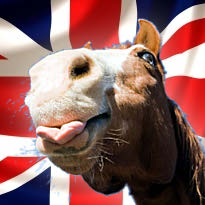 British bookmakers have adamantly rubbished the notion of a horseracing ‘betting right,’ as proposed by the racing industry in its submission to the UK government last week. The Association of British Bookmakers’ (ABB) CEO Dirk Vennix claimed that under such a scheme, “bookmakers would be forced to pay upfront for a licensed betting right, which, once granted to horse racing, could allow them to unilaterally set the value and terms of the right.” While Vennix believes it’s “high time to jettison the anachronistic levy,” he maintains that imposing a betting right would lead to massive job losses across the betting industry.
British bookmakers have adamantly rubbished the notion of a horseracing ‘betting right,’ as proposed by the racing industry in its submission to the UK government last week. The Association of British Bookmakers’ (ABB) CEO Dirk Vennix claimed that under such a scheme, “bookmakers would be forced to pay upfront for a licensed betting right, which, once granted to horse racing, could allow them to unilaterally set the value and terms of the right.” While Vennix believes it’s “high time to jettison the anachronistic levy,” he maintains that imposing a betting right would lead to massive job losses across the betting industry.
On the other side of the equation, the Levy Board met to determine how best to carry on with less Levy contributions at their disposal. The choice was between decreasing the number of fixtures it funds, or reducing the amount of funding it provides each fixture, but the meeting concluded without reaching a consensus on how to proceed. With the next Board meeting not due until August, the 2012 fixture list will likely not be published until September. What that list will look like is anybody’s guess, but British Horseracing Authority (BHA) chairman Paul Roy said that “providing funding for all existing levy criteria slots … is not an acceptable option and will just result in a further deterioration of the racing programme.”
That deterioration was on full display last weekend, when multiple courses simultaneously served up high-profile fixtures, leading to trainers complaining that there weren’t enough jockeys to fill the saddles. Bookmakers have proposed a schedule that would deliver a predictable and steady stream of product on offer, with four meetings on Saturdays and three on weekdays, with a fixed number of races per hour. In return, the ABB would “negotiate an overall figure which is the value of that core fixture list.”
The ABB also envisions a scheme whereby “individual operators should also be able to negotiate with individual racecourses for additional product outside the core product offering.” Such negotiations would relegate the BHA to a consultant role “as an important stakeholder in the process.” Sorry, did you say ‘important’ or ‘impotent?’
Impotence isn’t a problem for French horseracing operator Pari Mutuel Urbain (PMU). The company, whose monopoly status recently received a favorable ruling from the European Court of Justice, posted a 3.9% bump in revenues over the first six months of 2011 compared to the same period last year. Racing handle was up 3.4% to $6.86b, while total wagering (including sports wagering and poker) was up 8.1% to $7.16b. PMU’s online operation was the star performer, with wagers up 63.9% to $898.2m.